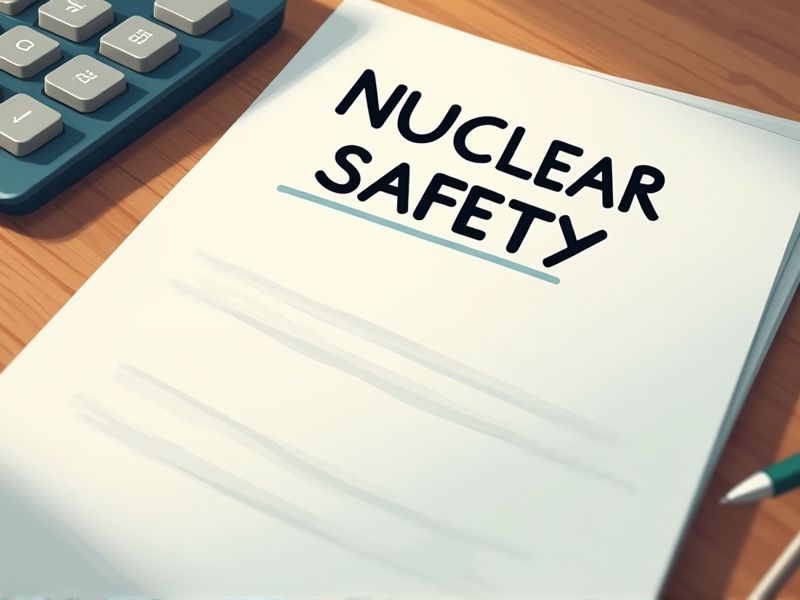
The role of a Nuclear Safety Officer involves managing and mitigating risks associated with nuclear operations, necessitating a comprehensive understanding of complex safety protocols. Obtaining specific certifications ensures that these professionals are equipped with the knowledge and skills needed to adhere to stringent regulatory standards and industry best practices. Certifications validate an officer's expertise in areas such as radiation protection, emergency response, and safety management systems. Important certifications needed for a Nuclear Safety Officer include those related to these critical domains.
NRC Basic Nuclear Safety Training
NRC Basic Nuclear Safety Training equips Nuclear Safety Officers with critical knowledge of regulatory requirements, ensuring they adhere to established safety protocols. This training enhances awareness of potential hazards and risk mitigation strategies, which reduces the likelihood of incidents. Mastery of safety procedures through such training helps in effectively managing emergency situations and contributes to overall plant safety. Consistent implementation of these guidelines leads to a significant improvement in the facility's safety culture and operational efficiency.
Radiation Protection Technician Certification
Radiation Protection Technician Certification equips professionals with the knowledge to effectively monitor and control radiation exposure, ensuring safety standards are met. This certification provides a comprehensive understanding of radiological hazards, essential for making informed decisions in nuclear environments. The certification validates a technician's ability to implement safety protocols and emergency procedures that minimize risk. Having certified technicians in a nuclear facility enhances public trust and reinforces a commitment to maintaining rigorous safety standards.
Certified Nuclear Safety Professional (CNSP)
The complexity of nuclear systems mandates that a Certified Nuclear Safety Professional (CNSP) possesses specialized knowledge to effectively manage and mitigate potential risks. CNSPs, through rigorous training and certification, ensure adherence to stringent safety protocols, thereby protecting both personnel and the environment. Their expertise enables them to identify, assess, and respond to potential nuclear hazards, thus minimizing incidents. Regulatory bodies often require CNSP credentials to meet compliance standards and enhance public and stakeholder trust in nuclear operations.
Nuclear Criticality Safety Engineer Certification
Nuclear Criticality Safety Engineer Certification equips safety officers with specialized knowledge to prevent criticality accidents, enhancing their ability to manage nuclear materials safely. The certification provides a standardized framework of expertise, ensuring that safety officers possess the necessary skills to adhere to regulatory requirements effectively. By obtaining this certification, safety officers demonstrate their competence in evaluating and mitigating risks associated with nuclear criticality. The certification fosters a culture of safety and accountability in nuclear facilities, reducing the likelihood of accidents and ensuring public and environmental protection.
Integrated Safety Management (ISM) Certification
Integrated Safety Management (ISM) Certification provides a structured framework essential for ensuring nuclear safety officers can systematically assess and control risks associated with nuclear operations. This certification ensures officers are trained to integrate safety into every aspect of their work, minimizing the likelihood of oversight that could lead to accidents. Without ISM Certification, nuclear safety officers might lack the standardized approach needed to consistently implement safety protocols. The certification also promotes continuous improvement in safety practices, crucial for adapting to evolving industry standards and technological advancements.
HAZWOPER Certification
HAZWOPER Certification ensures a Nuclear Safety Officer understands hazardous waste operations and emergency response protocols. The certification provides necessary training for handling hazardous substances safely, reducing the risk of contamination and accidents. Knowledge from HAZWOPER enhances capability in implementing safety measures in nuclear facilities, safeguarding both workers and the environment. Compliance with HAZWOPER standards is often required to meet federal regulations and industry standards for nuclear safety operations.
OSHA Radiation Safety Certification
OSHA Radiation Safety Certification is needed for a Nuclear Safety Officer to ensure understanding of federal guidelines and protective measures against radiation exposure. This certification helps them implement safety protocols effectively, reducing health risks to personnel and the environment. It establishes a baseline of competence and credibility in handling potential radiation hazards. Certification aids in compliance with legal and safety standards, minimizing the likelihood of regulatory penalties.
NEBOSH Health and Safety Certification
The NEBOSH Health and Safety Certification provides essential knowledge in risk management, crucial for nuclear safety officers who must identify and mitigate hazards in high-stakes environments. It ensures that officers are well-versed in health and safety regulations, enhancing compliance and operational safety. By equipping professionals with critical analysis skills, NEBOSH aids in effective decision-making amidst complex nuclear safety scenarios. The certification standardizes safety practices, facilitating a cohesive approach across the nuclear industry.
ISO 45001 Occupational Health and Safety Management Certification
ISO 45001 certification provides a standardized framework for managing health and safety risks, which is crucial for a Nuclear Safety Officer due to the high-stakes environment they operate in. Implementing ISO 45001 helps in identifying potential hazards and implementing controls that reduce accidents and health issues, enhancing workplace safety in the nuclear industry. Companies with ISO 45001 certification tend to demonstrate compliance with regulatory requirements, thus minimizing potential legal challenges. Certification fosters a safety culture that encourages continuous improvement and employee involvement, which is vital for proactive risk management in nuclear facilities.
Emergency Preparedness and Response Management Certification
The certification ensures that Nuclear Safety Officers are equipped with critical knowledge to effectively manage emergency situations. A well-prepared officer can significantly reduce the potential impact of nuclear incidents on the environment and public health. Regulatory bodies often require such certification to ensure compliance with safety standards. Training in emergency preparedness enhances the officer's ability to coordinate with other agencies, improving overall response efficiency.
Summary
When you receive certifications as a Nuclear Safety Officer, your credibility and expertise in handling nuclear materials increase. This can result in enhanced trust from your peers and supervisors, leading to better career opportunities. The certification also strengthens your knowledge base, substantially reducing the likelihood of safety incidents. Organizations may rely on your certified skills to improve their overall safety protocols and compliance with regulations.
